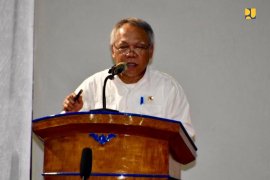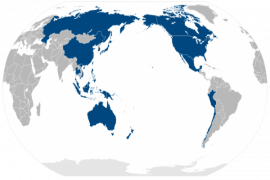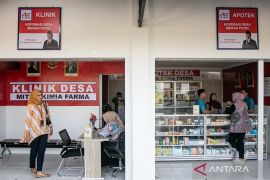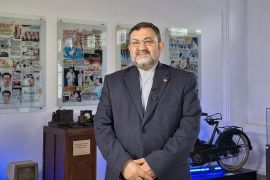We are going to focus the budget on development of good quality infrastructure facilities in our efforts to improve the pace of economic development,"Jakarta (ANTARA News) - Despite President Susilo Bambang Yudhoyono`s efforts over the past two years to increase the state budget allocation for infrastructure development, many quarters have assssed the amounts so far to be too small for accelerating economic development.
According to a World Bank economist, Indonesia has to increase its budget allocation if it wants to achieve the goals of its economic development as outlined in its master plan.
World Bank trade economist Henry Sandee said recently that so far Indonesia had allocated only a small amount of funds for the development of its infrastructures.
In the last ten years, the allocation for infrastructure was only about two to three percent, yet now there has been an improvement as it has been increased to 19.3 percent, he said.
Actually, in the last two years, President Yudhoyono had always promised to focus on infrastructure in order to boost the country`s economic development. The budget for infrastructure in 2011 was raised from Rp108 trillion in 2010 to RP126 trillion in 2011.
"We are going to focus the budget on development of good quality infrastructure facilities in our efforts to improve the pace of economic development," President Susilo Bambang Yudhoyono said when he delivered the government`s financial note and the 2011 draft State Budget (APBN) in August 2010.
In the meantime, when he delivered the 2012 draft state budget last August, President Yudhoyono said the government had set Rp168.1 trillion in the 2012 Draft State Budget for the development of infrastructures, including energy, food resilience and communications infrastructure.
He said that in the 2012 draft state budget the allocation for capital expenditure was set at Rp168.1 trillion, up Rp27.2 trillion or 19.3 percent from the 2011 revised state budget.
According to the World Bank`s trade economist, there has been an increase, yet it is not enough for accelerating economic development.
"There has been an improvement because capital expenditure for infrastructures has increased 19.3 percent, but if it is willing to achieve its MP3EI (Master Plan for Acceleration of Indonesia`s Development and Economic Expansion) target, it should increase further the allocation," Henry Sandee said.
The funds Indonesia allocates for infrastructure development, including those for 2012 which stand at Rp168.1 trillion, are still small, Henry said.
The budget for infrastructure development in advanced countries like Germany usually accounts for seven to eight percent of their Gross Domestic Product (GDP), Henry Sandee.
He said Indonesia`s fund allocations for the infrastructure sector in the last ten years only account for about two to three percent of its GDP. Indonesia`s total GDP IN 2010 was recorded at Rp6,422 trillion while its allocation for infrastructures was only Rp134.61 trillion or only about 2.09 percent of its GDP.
One of the strategy to achieve the MP3I target, according to the WB, is to cut logistics funds which at present reached 20 percent of the total operational and production costs.
The MP3I goals included an effort to include Indonesia among the world`s big ten economies with a gross domestic product of US4.5 trillion and a per capita income of US$15,000. Indonesia is currently included in the world`s big 17 economies with a per capita income of US$3,000.
Besides small budget, the government is also slow in absorbing budget for the development of infrastructure.
Up the end of last August, the absorption of the 2011 budget was still low, namely only 51.3 percent. Moreover, the realization of capital expenditure was only 26.9 percent.
"It is not good if the budget surplus is too big because some infrastructure projects which should be finished would be neglected," Kemal Azis Stamboel, member of House Commission XI on financial affairs said on Monday.
In the meantime, Director General of State Treasury Agus Suprijanto has previously told a hearing with Commission XI of the House that the budget surplus up to the middle of September reached Rp74.3 trillion, which increased from Rp41.01 trillion at the end of last August.
The surplus was the difference between the realized state income of Rp779.9 trillion, or 66.2 percent of the revised 2011 state budget`s ceiling, and the realized state spending amounting to Rp700.6 trillion.
Kemal said that the delay in the development of an infrastructure project would reduce the country`s supporting capacity in generating economic growth, creation of more job opportunities and improving the people`s prosperity.
"In addition, our competitive edge will be reduced in the face of our competitors," he added.
He said that this year, the ranking of Indonesia`s competitiveness dropped two points from 44 last year to 46. And one of the causes was related to the lack of infrastructures.
"This should be kept as an important note, so that parties responsible for the implementation of capital expenditure, particularly the one that concerns infrastructures, will seriously realize the absorption of the budget while not neglecting the funds that have been allocated," Kemal said.(*)
Reporter: Andi Abdussalam
Editor: Aditia Maruli Radja
Copyright © ANTARA 2011











